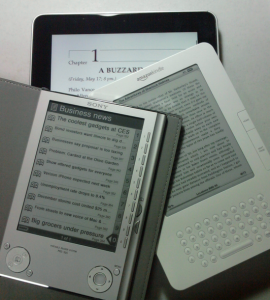 In January of last year, I originally argued the librarian’s dilemma was that of figuring out what course of action libraries should take in the eBook arena. A year later, it seems there is still no clear answer! Given the recent Google Books decision (info via the Disruptive Library Technology Jester blog) and the public discussions from both OverDrive and Harper Collins, I don’t think any clear answer is coming soon!
In January of last year, I originally argued the librarian’s dilemma was that of figuring out what course of action libraries should take in the eBook arena. A year later, it seems there is still no clear answer! Given the recent Google Books decision (info via the Disruptive Library Technology Jester blog) and the public discussions from both OverDrive and Harper Collins, I don’t think any clear answer is coming soon!
So what does a library do? Remember, the choices they make will ultimtely affect you, the eBook buyer, reader and enthusiast!
Ultimately, I think libraries should focus for now on the free repositories available for use. Given the advances in Google Books, Hathi Trust, the Open Library and others, this course of action will help them stabilize their budgets, offer more choices to their patrons (YOU!) and not be locked into a vendor’s approach to the eBook world.
Is that realistic? In some cases yes, in others no….here’s why. The massive repositories now online or going online are promising to multiply a library’s local collection by 10, 20, even a 100 times more than what they could get from a vendor–all in a multiplicity of formats. Almost any subject under the sun is now available for library patrons.
Looking for classic American and English literature? Check–got that here. How about common non-fiction subjects such as gardening, pirates, and even science fairs? Yep-all of those are available! These sample subjects are just the tip of the iceberg as to what is out available.
However, this free approach can be unrealistic if the patron demand is for the best sellers, the hot new fiction that only the vendor can offer. Would this demand be better served by a real paper version? There’s really no right or wrong at this point, as libraries alone know what their patrons really want.
I guess the upshot here is that given the uncertainties of the current eBook situation, I feel it would be better for libraries to minimize their eBook purchasing until some sort of standard can be worked out–but still use the (sometimes, often) free resources to enhance and stabilize their local collections.
This way, eBook enthusiasts like you and me can still find lots of goodies for our ebook readers. Colllection integration of various free resources seems to be a better approach than a one shot only approach from any particular vendor. Given the public API’s and integration with library standards such as OCLC and others, this doesn’t seem to be too arduous to implement.
So what do you think? Realistic or just “pie-in-the sky”? My thoughts? I think it’s workable, but secretly, I’m holding out for the Digital Public Library myself!

































Tony, don’t be surprised at how long this is taking to work out… remember, ebooks have been around for 40 years, and still haven’t worked out many of its problems!
I agree that libraries should take advantage of the free repositories out there… mainly in order to set up their processes, watch them in action, troubleshoot them, and nail down the details to a workable system. Then take that system to the paid repositories, confident that the system works, and putting libraries in a strong position to tell the repositories what they need.
Of course, I’m still concerned that all of this, like traditional library systems, will completely bypass the incredible wealth of independent material that the digital era is making possible… what are libraries doing to obtain indie books? Not all of them, obviously, but even the cream of the indie crop will be missed by the current system, and a new system that essentially mimics the current system. That would be something to bolster the library systems’ value, at a time when the libraries feel the need to add value in order to justify their continued existence.
This article is poorly researched, badly edited, and suffers from a lack of discipline with regard to punctuation. I expect more from a website about books.
“what are libraries doing to obtain indie books?”
Exactly my thought! I read almost nothing but indies, there are many fine books out there are very reasonable prices. An enterprising indie author should create a service that provides indie books to libraries. I imagine working one-on-one with each author would be too time consuming for libraries but as a group it would work well.
Established authors who self-publish their backlists would be good as well.
Another reason for an Indie Publishers Association ..